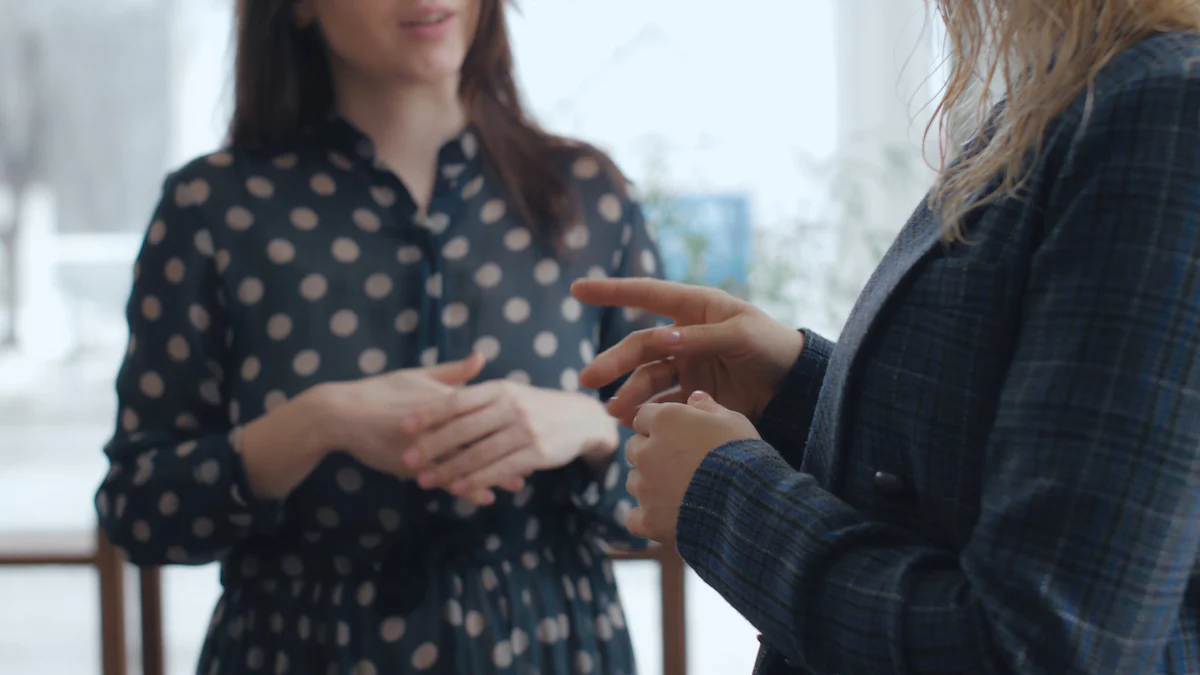
Every day, deaf people face numerous challenges in communication. Whether in healthcare settings or social interactions, these barriers can lead to misunderstandings and feelings of isolation. For instance, only a small percentage of hospitals have policies for effective communication with deaf patients, often relying on family members as interpreters. This lack of direct communication can result in poorer health outcomes and increased emergency room visits. Addressing these barriers is crucial for fostering inclusion and ensuring that everyone can interact meaningfully in society.
Understanding Daily Communication Barriers
Common Barriers Faced by Deaf People Having a Hard Time
Miscommunication in Social Settings
You might find social settings challenging if you're deaf. Conversations in noisy environments can become a maze of misunderstandings. Lip-reading often fails when people speak quickly or turn away. This can make you feel left out during gatherings or casual chats.
Challenges in Professional Environments
Workplaces present their own hurdles. Meetings without interpreters or captioning can leave you guessing. Many employers lack awareness about the needs of deaf employees. This can lead to missed opportunities and frustration. You deserve an environment where communication flows smoothly.
Psychological Impact of Communication Barriers
Feelings of Isolation
When communication breaks down, isolation creeps in. You might feel disconnected from friends or colleagues. This sense of being on the outside can weigh heavily on your mind. It's important to recognize these feelings and seek support.
Impact on Self-esteem
Constant barriers can chip away at your self-esteem. You may doubt your abilities or feel undervalued. This isn't just about missing words; it's about missing connections. Building confidence starts with understanding these impacts and finding ways to overcome them.
"Physicians often struggle with communication when interacting with deaf patients. Education and interpreter availability are crucial."
This highlights the broader need for awareness and training across various settings. By addressing these barriers, you can foster a more inclusive and supportive environment.
Strategies to Overcome Communication Barriers
Utilizing Technology 
Technology can be a game-changer for you. It offers tools that make communication smoother and more accessible. Let's explore some options.
Video Relay Services
Video Relay Services (VRS) are another fantastic resource. They let you communicate with hearing individuals through a sign language interpreter. You sign to the interpreter via video, and they relay your message verbally to the other person. This service can be invaluable in both personal and professional settings. It ensures that your message is clear and understood, reducing the chances of miscommunication.
Hearview Glasses
Hearview glasses are a revolutionary tool for real-time communication. They provide live captions for spoken conversations, allowing you to see what people are saying right in your line of sight. Whether you’re at a meeting, out with friends, or in a noisy environment, Hearview ensures you stay in the conversation. The glasses recognize multiple speakers and can even differentiate between voices, labeling them as "Speaker 1," "Speaker 2," and so on. This feature makes it easier to follow discussions without relying solely on lip-reading or guessing. With Hearview, conversations become more accessible and seamless.
Learning and Using Sign Language
Sign language is a powerful tool for you. It opens up a world of communication possibilities.
Benefits of Sign Language
Learning sign language has numerous benefits. It allows you to express yourself fully and connect with others who use it. Sign language can enhance your social interactions and help you feel more included. It's not just about words; it's about building connections and understanding.
Advocacy and Awareness
Advocacy plays a crucial role in overcoming barriers. By raising awareness, you can help create a more inclusive society.
Promoting Deaf Culture
Promoting deaf culture is essential. It helps others understand your experiences and challenges. Sharing your story and educating others can foster empathy and support. When people learn about deaf culture, they become more aware of the barriers you face and how they can help.
Encouraging Inclusive Practices
Encouraging inclusive practices is vital for change. Advocate for policies that support accessibility in public spaces and workplaces. Encourage businesses and organizations to adopt inclusive communication methods. By doing so, you help create environments where deaf people having a hard time can thrive.
Incorporating these strategies into your daily life can make a significant difference. Technology, sign language, and advocacy are powerful tools that can help you overcome communication barriers. Embrace these resources and share your journey with others. Together, we can build a more inclusive world.
Building Supportive Environments

Creating a supportive environment is crucial for you to overcome communication barriers. Let's explore how family, friends, and the community can play a vital role.
Role of Family and Friends
Encouraging Open Communication
Your family and friends can be your strongest allies. Encourage them to engage in open communication. They should ask questions and show genuine interest in understanding your needs. This openness fosters trust and makes interactions more meaningful. You might find it helpful to share resources or tips on effective communication. This way, everyone learns together.
Providing Emotional Support
Emotional support from loved ones can make a big difference. They can help you navigate feelings of isolation or frustration. A simple gesture, like checking in regularly, shows they care. Encourage them to attend events or workshops about Deaf culture. This shared experience can strengthen your bond and enhance mutual understanding.
Community and Organizational Support
Support Groups and Networks
Connecting with others who share similar experiences can be empowering. Support groups offer a space where you can express yourself freely. These networks provide valuable insights and strategies for overcoming challenges. You can find local groups or online communities that focus on Deaf culture and advocacy. Engaging with these groups can boost your confidence and sense of belonging.
Accessibility in Public Spaces
Advocating for accessibility in public spaces is essential. You deserve environments where communication is seamless. Encourage local businesses and organizations to implement inclusive practices. This might include installing visual alerts or providing sign language interpreters. By raising awareness, you help create spaces where everyone feels welcome and understood.
"The guidance document provides essential information for interviewing Deaf and hard of hearing individuals, including considerations and sample questions for interviews."
This highlights the importance of understanding and accommodating your needs in various settings. By building supportive environments, you pave the way for better communication and inclusion.
Overcoming communication barriers is crucial for fostering inclusion and ensuring meaningful interactions. By implementing strategies like using technology, learning sign language, and advocating for awareness, you can make a significant difference. Remember, your efforts can create a more inclusive world for everyone.
"The majority wanted to have better solutions and plans to deal and communicate with deaf patients."
This sentiment highlights the importance of taking action. Support and advocate for deaf individuals in your community. Your involvement can lead to positive change and a more understanding society. Let's work together to break down these barriers.


